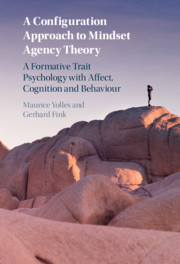 A Configuration Approach to Mindset Agency Theory
A Configuration Approach to Mindset Agency Theory Book contents
- A Configuration Approach to Mindset Agency Theory
- A Configuration Approach to Mindset Agency Theory
- Copyright page
- Contents
- Figures
- Tables
- Foreword
- Introduction
- Part I Cybernetic Sociopsychology and Agency
- Part II From Cognition to Affect
- Chapter 6 Cognition Agency
- Chapter 7 Cognition Personality
- Chapter 8 Affect Types and Mindset Types
- Chapter 9 Affect and Cognition
- Summarising Narrative for Part II
- Part III Modelling Identity Types through Agency
- Part IV Formal Possibilities in Mindset Agency Theory
- Part V Conclusion
- Book part
- Notes
- Glossary
- References
- Index
Summarising Narrative for Part II
from Part II - From Cognition to Affect
Published online by Cambridge University Press: 28 July 2021
- A Configuration Approach to Mindset Agency Theory
- A Configuration Approach to Mindset Agency Theory
- Copyright page
- Contents
- Figures
- Tables
- Foreword
- Introduction
- Part I Cybernetic Sociopsychology and Agency
- Part II From Cognition to Affect
- Chapter 6 Cognition Agency
- Chapter 7 Cognition Personality
- Chapter 8 Affect Types and Mindset Types
- Chapter 9 Affect and Cognition
- Summarising Narrative for Part II
- Part III Modelling Identity Types through Agency
- Part IV Formal Possibilities in Mindset Agency Theory
- Part V Conclusion
- Book part
- Notes
- Glossary
- References
- Index
Summary
The cognition agency is a theoretical development that configures cognition with traits which determine its orientation. By cognition is meant the nature and outcome of the immanent and adventitious influences that impact agency. Immanent influences are the result of internal agency dynamics, while adventitious influences are a result of external interactions. Cognitive processes that result in behaviour are not always accessible to conscious agency reflection. The cognition agency has a character defined through its traits. The traits refer to agency variables that are formative in that they offer fundamental control and characterising functions.
- Type
- Chapter
- Information
- A Configuration Approach to Mindset Agency TheoryA Formative Trait Psychology with Affect, Cognition and Behaviour, pp. 322 - 328Publisher: Cambridge University PressPrint publication year: 2021
